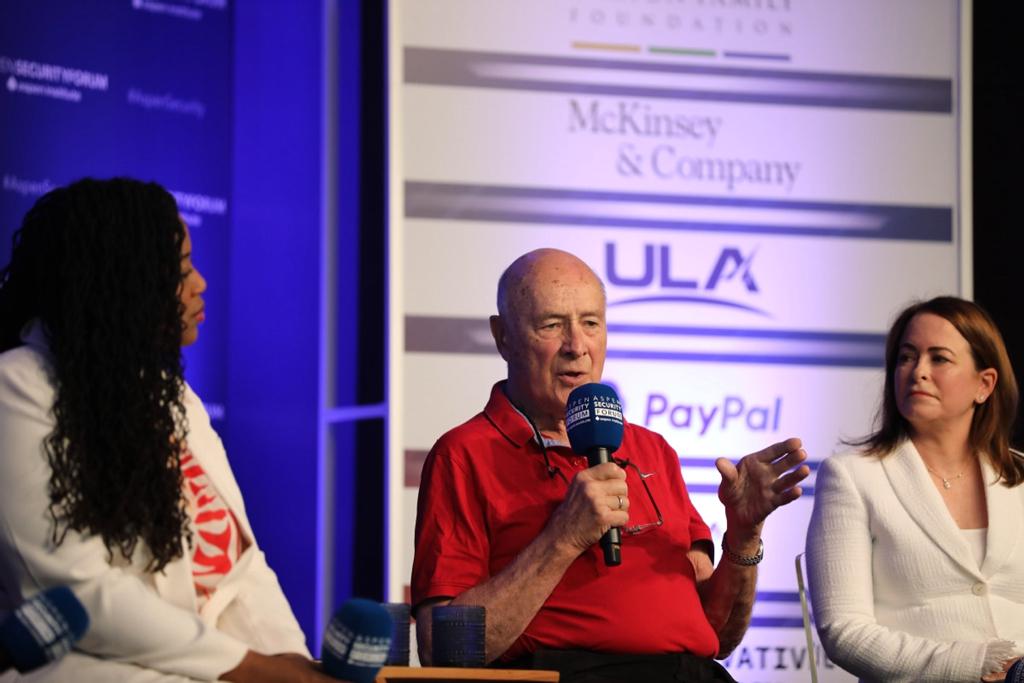With Joseph Nye's passing, what has the US lost?

Joseph Nye (center), dean emeritus of Harvard Kennedy School and former US assistant secretary of defense, speaks at a panel discussion on US-China relations during the Aspen Security Forum in Colorado, which ended on Friday. Zhao Huanxin / China Daily
The US has just lost a supporter of its national interests and global leadership. "Joseph Nye, Harvard professor, developer of 'soft power' theory, and an architect of modern international relations, dies at 88," the Harvard Kennedy School announced Wednesday, local time.
Nye, a leading voice on China-US relations, was a frequent interviewee in the Global Times, with the newspaper speaking to him multiple times. The last interview occurred in August 2023, when he had just returned from travels but still gladly accepted a video interview with the Global Times. Nye's voice was deep and steady, his words deliberate and calm. Dressed in a sky-blue sweater, the scholar appeared focused when discussing the challenges in China-US relations, yet a bright smile lit up his face when he reminisced about his experiences in China.
During the interview, he told Global Times that he had been to China more than 20 times. "Probably 20 or 25. I don't have a good count," he said, adding that he was planning to visit Beijing the following October. He did. In October of that year, Nye appeared on Peking University's podium, and soon after, he re-emerged as an active figure on the frontlines of China-US exchanges.
"The real existential danger is if the US and China 'blunder into war,'" "The competition is going to continue. But we should not forget that there's also an important value in cooperation," these were the key points Nye repeatedly emphasized throughout the interview.
Another interview with Nye conducted by the Global Times took place in 2020. We remember the process of securing the interview; he had just finished speaking with another Chinese media outlet and graciously promised to speak with us later once he had developed new ideas. When the interview finally happened, his assertion that "the rules internationally and the norms that go with them depend upon state behavior, and the view that China simply breaks rules is not correct" felt refreshingly insightful. His serious attitude toward the media, combined with his professionalism as a scholar, truly stood out. You could sense the weight of responsibility he embraced as a public intellectual, eager to share his knowledge and perspectives.
Nye constantly stressed that the US and China are not destined for war. He was a supporter of China-US engagement. His longstanding advocacy for cooperation was well-documented in his speeches and interviews.
Before his passing, Nye had long been dedicated to writing and engaging in international affairs. He wrote in a Washington Post article in March that "President Donald Trump does not understand soft power or its role in foreign policy." He stated that if an ally sees you as benign and trustworthy, they are more persuadable and likely to follow your lead. If they see you as an unreliable bully, they are more likely to drag their feet and reduce their interdependence when they can.
"In the enduring debate about America's global role, some Americans argue that the US must be a feared dominator, while others believe it should be a beloved leader. Nye unequivocally embodied the latter perspective," Lü Xiang, a research fellow at the Chinese Academy of Social Sciences, told the Global Times.
Undeniably, as an American scholar, what Nye served was US national interest, US leadership, or more bluntly, US hegemony. Yet Nye did not believe in conquering the world through sheer force; instead, he emphasized the leading role - the idea that the US appeal should inspire other countries to willingly embrace its leadership. As he said, "in the information age, the mark of a great power is not just whose army wins, but also whose story wins."
He knows that American power has limits, and understands that coercion, threats, and overreliance on military might are unsustainable - goodwill and good deeds are equally important as hard strength, Lü said. This was precisely where Nye differed from today's US policymakers, Lü emphasized.
While recent successive US administrations have adopted a competitive and even hostile mind-set toward China, with hawkish anti-China opinions on the rise, Nye had been calling for cooperation with China. He was, in fact, safeguarding American interests - with wisdom and foresight. Sadly, voices like his have become an increasingly scarce commodity in US discourse.
When Nye first introduced the concept of "soft power" in the early 1990s, the US was at the peak of its global influence. US-style democracy, along with ideas like "city on a hill" and "beacon of hope," held considerable sway in the world. Back then, Nye and like-minded elites had great confidence in the country's future. That's why, in his final years, seeing how far today's America has strayed from those ideals has likely filled him with profound sorrow, Li Haidong, a professor at the China Foreign Affairs University, told the Global Times.
In his April 1 article, Nye wrote that the years 1945, 1991 and 2008 were turning points in history (which represents the WWII, Cold War and global financial crisis). "If future historians add 2025 to the list, it will be a result of US policy - a self-inflicted wound - rather than any inevitable secular development."
Only time will tell how and to what extent Nye's final warnings will prove prescient. But one thing is certain for now: With his passing, America has lost more than a scholar - it lost one of its few remaining pragmatic architects of influence and one of its intelligent men steeped in Asian culture and China-US relations.